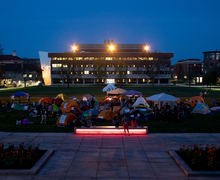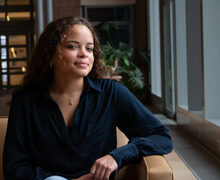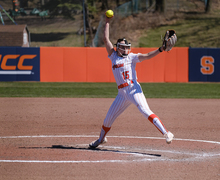Nobel Prize winner tells lending story
The bank owned by Nobel Peace Prize winner Muhammad Yunus has given loans to 100,000 beggars in Bangladesh during the past four years.
The small loans, Yunus said, have allowed the beggars to transform into door-to-door business people. They sell cookies, candy and merchandise, earning themselves open doors and living room seats across villages, Yunus said.
Yunus, the founder of Grameen Bank who has been hailed as the father of micro-credit, spoke in Hendricks Chapel Tuesday night about the process of forming his business as part of the 2009-10 University Lecture Series.
Yunus started by lending $25 to $30 to the poorest people in Bangladesh out of his own pocket during the mid-1970s. The bank does not require credit, collateral or signed documents and operates on trust. Today, it lends more than $100 million a month, almost all of which gets repaid, Yunus said.
Yunus looked at how established banks operated and did the opposite, he said. They gave loans to rich men, so he lent to women in remote villages. They required legal documents and collateral, so the Grameen Bank did not. And it worked.
Poverty is imposed on individuals and sustained by institutions like big banks, he said, and since the financial crisis hit last fall, the collateral big banks have rallied around has proved useless.
‘Should it be the banks who tell people they’re not credit-worthy?’ he said. ‘Or should it be the people who tell banks they’re not people worthy?’
His micro-credit model spread worldwide, starting with Asia and moving to the US.
It works ‘as beautifully in Brooklyn as it does in Bangladesh,’ he said.
Yunus was an economics professor at a Bangladeshi university when the country, stricken by famine and poverty, first achieved independence. He started to question the ‘elegant theories of economics’ he taught in the classroom. He walked to a village near the university and gave loans to women out of pocket, ones that no other bank would consider. He said he saw this as a one-time shot at trying to be useful to the villagers.
The problems, like poverty, that need to be fixed are difficult, Yunus said, ‘but the solution is so simple.’
When everyone who borrowed repaid him, he started to develop a bank to make more loans with investments coming from inside the villages.
The idea, he said, is that people need to be given the first $1 in order to make the next one. But classroom learning focuses on single-minded, ‘profit-maximizing’ business models, he said. They should teach students to create businesses to solve social problems, he said.
Grameen Bank tried to break the cycle of illiteracy by setting up elementary schools. Fifteen years after it began to help build elementary schools, the bank started making university loans to students with the ‘same inspirations and hopes’ as SU students, he said.
Technology will be a catalyst for social businesses, he said, so that problems related to poverty will disappear. But in order for them to help people and sustain themselves, they have to identify a problem first and stay mission-driven.
The purpose is to solve the problem by relying on the ‘energy and creativity’ of citizens and recycling profit back into the businesses, he said.
Young people can make a difference, he said, but don’t have to go to Bangladesh to do it.
‘Bring it down to bite-size’ and contribute to the neighborhood, he told students, and try to help five or six people find a way to get jobs, afford health care, and kick crime or addiction, Yunus said.
Yunus said he fears that donations to Haiti is ‘money wasted’ unless 10 percent of donations were put into creating businesses to build houses, provide for health care and turn Haiti green by replanting forests.
‘Disaster is a beautiful opportunity to rebuild the system the way it should have been built,’ he said.
Published on February 23, 2010 at 12:00 pm




